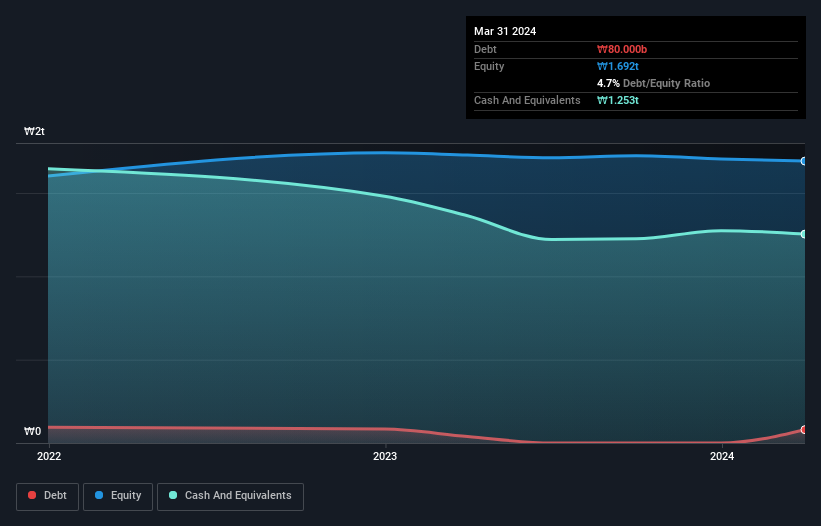Some say volatility, rather than debt, is the best way to think about risk as an investor, but Warren Buffett famously said that 'Volatility is far from synonymous with risk.' When we think about how risky a company is, we always like to look at its use of debt, since debt overload can lead to ruin. Importantly, SK bioscience Co.,Ltd. (KRX:302440) does carry debt. But is this debt a concern to shareholders?
When Is Debt A Problem?
Debt and other liabilities become risky for a business when it cannot easily fulfill those obligations, either with free cash flow or by raising capital at an attractive price. If things get really bad, the lenders can take control of the business. However, a more common (but still painful) scenario is that it has to raise new equity capital at a low price, thus permanently diluting shareholders. Of course, plenty of companies use debt to fund growth, without any negative consequences. When we think about a company's use of debt, we first look at cash and debt together.
See our latest analysis for SK bioscienceLtd
What Is SK bioscienceLtd's Debt?
You can click the graphic below for the historical numbers, but it shows that as of March 2024 SK bioscienceLtd had ₩80.0b of debt, an increase on ₩39.1b, over one year. But on the other hand it also has ₩1.25t in cash, leading to a ₩1.17t net cash position.

How Healthy Is SK bioscienceLtd's Balance Sheet?
According to the last reported balance sheet, SK bioscienceLtd had liabilities of ₩134.1b due within 12 months, and liabilities of ₩92.4b due beyond 12 months. Offsetting this, it had ₩1.25t in cash and ₩25.0b in receivables that were due within 12 months. So it can boast ₩1.05t more liquid assets than total liabilities.
This surplus suggests that SK bioscienceLtd is using debt in a way that is appears to be both safe and conservative. Due to its strong net asset position, it is not likely to face issues with its lenders. Succinctly put, SK bioscienceLtd boasts net cash, so it's fair to say it does not have a heavy debt load! When analysing debt levels, the balance sheet is the obvious place to start. But ultimately the future profitability of the business will decide if SK bioscienceLtd can strengthen its balance sheet over time. So if you're focused on the future you can check out this free report showing analyst profit forecasts.
In the last year SK bioscienceLtd had a loss before interest and tax, and actually shrunk its revenue by 4.9%, to ₩371b. We would much prefer see growth.
So How Risky Is SK bioscienceLtd?
While SK bioscienceLtd lost money on an earnings before interest and tax (EBIT) level, it actually booked a paper profit of ₩23b. So taking that on face value, and considering the cash, we don't think its very risky in the near term. With mediocre revenue growth in the last year, we're don't find the investment opportunity particularly compelling. The balance sheet is clearly the area to focus on when you are analysing debt. However, not all investment risk resides within the balance sheet - far from it. To that end, you should learn about the 3 warning signs we've spotted with SK bioscienceLtd (including 1 which is potentially serious) .
At the end of the day, it's often better to focus on companies that are free from net debt. You can access our special list of such companies (all with a track record of profit growth). It's free.
New: Manage All Your Stock Portfolios in One Place
We've created the ultimate portfolio companion for stock investors, and it's free.
• Connect an unlimited number of Portfolios and see your total in one currency
• Be alerted to new Warning Signs or Risks via email or mobile
• Track the Fair Value of your stocks
Have feedback on this article? Concerned about the content? Get in touch with us directly. Alternatively, email editorial-team (at) simplywallst.com.
This article by Simply Wall St is general in nature. We provide commentary based on historical data and analyst forecasts only using an unbiased methodology and our articles are not intended to be financial advice. It does not constitute a recommendation to buy or sell any stock, and does not take account of your objectives, or your financial situation. We aim to bring you long-term focused analysis driven by fundamental data. Note that our analysis may not factor in the latest price-sensitive company announcements or qualitative material. Simply Wall St has no position in any stocks mentioned.
Have feedback on this article? Concerned about the content? Get in touch with us directly. Alternatively, email editorial-team@simplywallst.com
About KOSE:A302440
SK bioscienceLtd
Engages in the research and development, production, and distribution of vaccines and biopharmaceuticals in Korea and internationally.
Mediocre balance sheet and slightly overvalued.
Market Insights
Community Narratives




